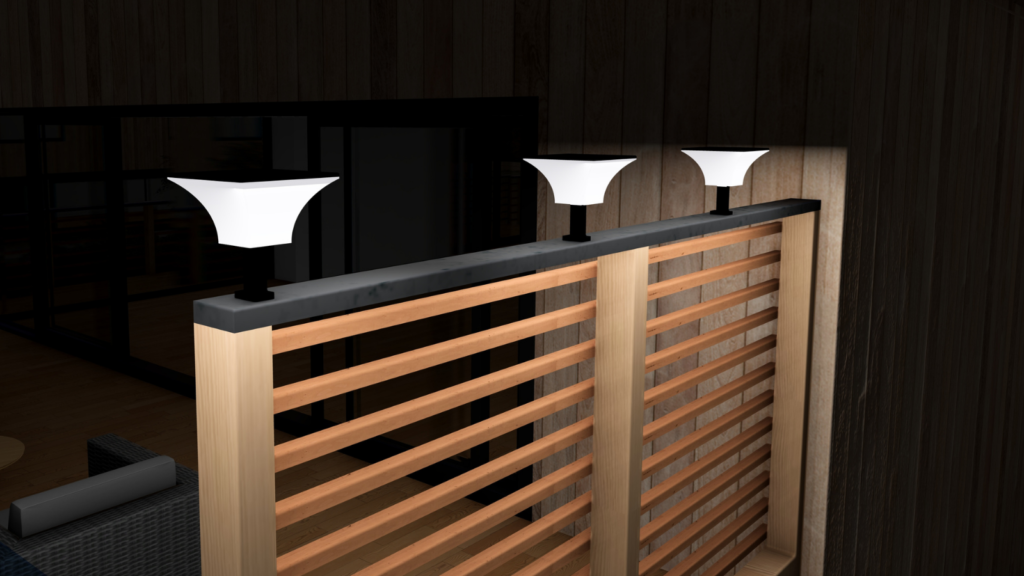Lithium-Ion vs. LiFePO4 Batteries in Solar Lamps: Which is Better?
Home – Info Center – Blogs –
Lithium-Ion vs. LiFePO4 Batteries in Solar Lamps: Which is Better?

By Michael Zhang || Updated on 15th May 2025
Michael Zhang is a seasoned professional with 15 years of experience in the solar lights industry. Throughout his career, he has been actively involved in product design and developing, gaining valuable expertise and insight into the industry. Known for his dedication and professionalism, Michael has contributed significantly to the growth and success of various solar lights projects. His extensive knowledge and hands-on experience make him a trusted authority in the field, and he continues to innovate and excel in his role.
Solar lamps are an eco-friendly and cost-effective solution for outdoor lighting, powering everything from streetlights to garden illumination. The battery is the heart of any solar lamp, storing energy collected during the day to provide light at night. Two popular battery types for solar lamps are standard lithium-ion and LiFePO4 (lithium iron phosphate). Both are advanced technologies, but which one is better suited for your solar lighting needs? In this article, we compare lithium-ion and LiFePO4 batteries based on performance, safety, lifespan, cost, and environmental impact to help you choose the best option.
Table of Contents
Understanding Battery Types in Solar Lamps
Batteries in solar lamps store energy generated by solar panels, ensuring reliable illumination after dark. The battery’s efficiency, durability, and safety directly affect the lamp’s performance and longevity. While both lithium-ion and LiFePO4 batteries are lithium-based, their chemical compositions and characteristics differ significantly.
Standard Lithium-Ion Batteries
Standard lithium-ion batteries, often using chemistries like lithium cobalt oxide or lithium manganese oxide, are widely used in electronics, electric vehicles, and solar lamps. They are known for their high energy density and compact design.
LiFePO4 Batteries
LiFePO4 batteries are a subtype of lithium-ion batteries that use lithium iron phosphate as the cathode material. They are gaining popularity in solar applications due to their enhanced safety and longevity.

Comparing Lithium-Ion and LiFePO4 Batteries
Let’s evaluate the two battery types across key factors to determine which is better for solar lamps:
Energy Density and Efficiency
- Lithium-Ion: Standard lithium-ion batteries have a higher energy density (150-200 Wh/kg), allowing them to store more energy in a smaller, lighter package. This makes them ideal for compact solar lamps where size and weight are critical.
- LiFePO4: LiFePO4 batteries have a lower energy density (90-120 Wh/kg), meaning they are bulkier for the same capacity. However, their charge/discharge efficiency is comparable, typically around 90-95%.
- Winner: Lithium-ion, for higher energy density and compact design.
Lifespan and Durability
- Lithium-Ion: Standard lithium-ion batteries offer 2,000-5,000 charge cycles, translating to 5-10 years of use in solar lamps, depending on usage and conditions. They perform well but can degrade faster under high temperatures or deep discharges.
- LiFePO4: LiFePO4 batteries excel in longevity, providing 4,000-8,000 charge cycles (10-15 years or more). They are more resistant to deep discharges and temperature fluctuations, making them ideal for harsh environments.
- Winner: LiFePO4, for superior lifespan and durability.
Safety
- Lithium-Ion: Standard lithium-ion batteries are generally safe with proper battery management systems (BMS) but can pose risks of thermal runaway or fire if overcharged, damaged, or exposed to extreme heat.
- LiFePO4: LiFePO4 batteries are inherently safer due to their stable chemical structure. They are highly resistant to thermal runaway, overcharging, and short-circuiting, making them a preferred choice for safety-critical applications.
- Winner: LiFePO4, for enhanced safety and stability.
Cost
- Lithium-Ion: Standard lithium-ion batteries are typically less expensive upfront due to mature manufacturing processes and widespread use. However, their shorter lifespan may lead to higher replacement costs over time.
- LiFePO4: LiFePO4 batteries have a higher initial cost due to specialized materials and production. Their extended lifespan, however, often makes them more cost-effective in the long run.
- Winner: Lithium-ion for short-term budgets; LiFePO4 for long-term value.
Environmental Impact
- Lithium-Ion: Standard lithium-ion batteries often use materials like cobalt or nickel, which can have significant environmental and ethical concerns during mining. Their shorter lifespan also means more frequent replacements, increasing waste.
- LiFePO4: LiFePO4 batteries are more environmentally friendly, as they avoid toxic materials like cobalt and have a longer lifespan, reducing waste. Their production still requires careful resource management, but the overall impact is lower.
- Winner: LiFePO4, for reduced environmental footprint.
Temperature Performance
- Lithium-Ion: Standard lithium-ion batteries perform well in moderate climates but can lose capacity or degrade faster in extreme heat or cold, requiring robust thermal management.
- LiFePO4: LiFePO4 batteries have excellent temperature tolerance, operating efficiently in a wide range (-20°C to 60°C). This makes them ideal for solar lamps in diverse climates, from deserts to cold regions.
- Winner: LiFePO4, for better performance in extreme conditions.
Why Choose LiFePO4 for Solar Lamps?
At FLIGREEN, we increasingly incorporate LiFePO4 batteries into our solar lamps to meet the growing demand for durable, safe, and sustainable lighting solutions. Here’s why LiFePO4 is a top choice for our products:
- Unmatched Longevity: Our LiFePO4-powered solar lamps last up to 15 years, minimizing maintenance and replacement costs for commercial and off-grid projects.
- Superior Safety: With LiFePO4’s stable chemistry, our lamps are safe for use in schools, communities, and urban environments.
- Reliable Performance: Our lamps deliver consistent illumination in extreme weather, ensuring reliability for clients worldwide.
- Eco-Conscious Design: We prioritize sustainability by using long-lasting, cobalt-free batteries that reduce environmental impact.
When Might Standard Lithium-Ion Batteries Be Preferred?
While LiFePO4 batteries offer significant advantages, standard lithium-ion batteries may be better suited for certain scenarios:
- Compact Designs: For small, lightweight solar lamps (e.g., garden or decorative lights), lithium-ion’s higher energy density allows for sleeker designs.
- Budget Constraints: If upfront cost is a primary concern and the project has a shorter timeline, lithium-ion batteries can be a cost-effective choice.
- Mild Climates: In regions with stable temperatures, lithium-ion batteries perform adequately without the need for LiFePO4’s enhanced durability.
Conclusion: LiFePO4 Takes the Lead
When comparing standard lithium-ion and LiFePO4 batteries for solar lamps, LiFePO4 stands out as the better choice for most applications. Its exceptional lifespan, enhanced safety, superior temperature tolerance, and lower environmental impact make it ideal for commercial, residential, and off-grid lighting projects. While standard lithium-ion batteries offer advantages in compactness and upfront cost, their shorter lifespan and safety concerns limit their suitability for long-term, high-performance applications.
At FLIGREEN, we’re committed to delivering cutting-edge solar lamps powered by LiFePO4 batteries for maximum reliability and sustainability. Ready to light up your next project with advanced solar technology? Contact us today for a free consultation or download our product catalog to explore our innovative solar lighting solutions.
Related Blogs
September 20, 2024
August 12, 2024
August 3, 2024
Share Via:
Get in Touch with Us Now!
Got questions or feedback? We’d love to hear from you! Just fill out the form below, and our friendly team will respond ASAP.
